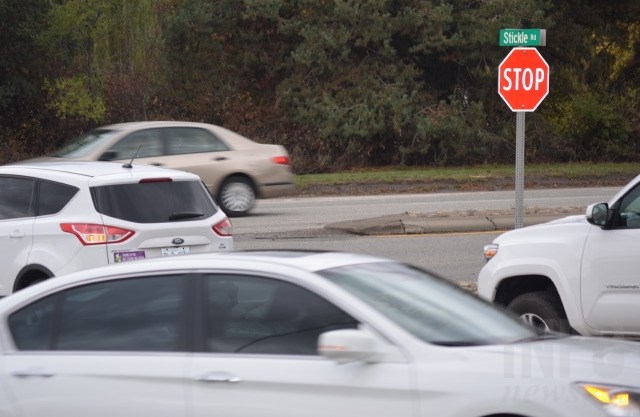
The intersection of Stickle Road and Highway 97 in Vernon has been the focus of ongoing debate in the community for over a year.
(CHARLOTTE HELSTON / iNFOnews.ca)
October 14, 2016 - 6:30 PM
"BY THE TIME THIS RIDICULOUS ODYSSEY IS OVER THESE MOUNTING CONSULTATION EXPENSES MAY BE MORE THAN THE LIGHT WOULD HAVE COST IN THE FIRST PLACE"
VERNON - The Stickle Road improvement project in Vernon has been sent back to the drawing board multiple times over the past year and a half, and all those traffic studies and design costs are adding up.
A freedom of information request by iNFOnews.ca shows the Ministry of Transportation has spent roughly $370,000 to date exploring various options for the dangerous intersection of Stickle Road and Highway 97, just north of Vernon.
The original improvement plan came out in May 2015 at an open house. The idea was a right-in, right-out only configuration that would eliminate left-hand turns from Stickle Road onto Highway 97. That plan was quickly shot down by politicians and members of the public.
Records show the provincial government was billed nearly $61,000 for engineering services, design work and studies related to the Stickle Road project prior to the open house.
After the proposal was slammed by the community, R.F. Binnie & Associates Ltd., the contractor hired by the ministry to research options for the intersection, was asked to explore other designs, including signalization and a protected-T intersection. Work carried out between May and July 2015, much of it focussed on the concept of a protected-T intersection, racked up roughly $105,000.
But politicians and residents weren’t happy with the protected-T idea either, and the ministry again went back to the drawing board. In August 2015, the province started investigating a new idea which involves paving through a wetland area to connect a frontage road with 20 Street behind Rona. Since the ministry shifted efforts to the 20 Street extension concept, work conducted by Binnie, and Golder Associates (a geotechnical and environmental consulting firm), has run up costs of just under $203,000 in design concepts, groundwater tests, and engineering studies.
And this latest iteration of the plan still isn’t pleasing everyone. A naturalist group is opposing the project on grounds it will destroy habitat for wildlife and a valued green space used by walkers and cyclists.
Some local politicians, such as Vernon city councillor Scott Anderson, question why the ministry hasn’t developed the one design most locals actually want: a traffic light.
“I find it astonishing that the ministry repeatedly rejects a cost-effective traffic light solution that most stakeholders want, while racking up well over a quarter million dollars in costs to try to find a far more expensive alternative that few stakeholders want,” Anderson says. “By the time this ridiculous odyssey is over these mounting consultation expenses may be more than the light would have cost in the first place. Where’s the common sense in that?”
North Okanagan Regional District director Mike Macnabb is also frustrated with the process. His concerns with the current idea of extending 20 Street include loss of parkland, as well as unforeseen consequences such as issues on other roads due to the new traffic flow.
“I think this is a pretty expensive experiment with no certainty,” he says.
While surprised at how much work the ministry contracted out to private firms, Macnabb says studies do cost money but are worthwhile.
“Going to the public too soon with no plan is not effective. You have to start somewhere,” Macnabb says.
He feels that engaging the public, and spending money coming up with the best design concept, is appropriate in a multi-million dollar construction project — as long as it’s fruitful.
“It’s how much are you actually going to listen to the public? That’s the more important thing to ask. And if your preconceived idea is not going to change, and you’re only doing this because you have to, that is a problem and not a good use of money,” Macnabb says.
The ministry has previously said a traffic light would inhibit traffic flow, increase the risk of rear-enders, and create more greenhouse gas emissions — but Macnabb is hopeful the stance may change with the upcoming provincial election.
“If there’s a change of government, the new ministry may look at this and say this does not make sense. It could be completely different,” he says.
We requested an interview with Vernon-Monashee MLA Eric Foster but did not hear back by deadline.
Editor’s note: Our freedom of information request resulted in more than two dozen individual invoices and it remains unclear if certain costs were itemized twice. We have contacted the Ministry of Finance for clarification of these amounts, but have not yet received an answer. As such, the amounts represented in this article are approximate. You can view the documents directly here.
When we submitted our freedom of information request in July 2016, we requested all records from April 1, 2015 to date. Due to the length of time it took for the ministry to process our request, our story does not reflect any additional costs accrued between July and today’s date.
To contact a reporter for this story, email Charlotte Helston or call 250-309-5230 or email the editor. You can also submit photos, videos or news tips to the newsroom and be entered to win a monthly prize draw.
We welcome your comments and opinions on our stories but play nice. We won't censor or delete comments unless they contain off-topic statements or links, unnecessary vulgarity, false facts, spam or obviously fake profiles. If you have any concerns about what you see in comments, email the editor in the link above.
News from © iNFOnews, 2016